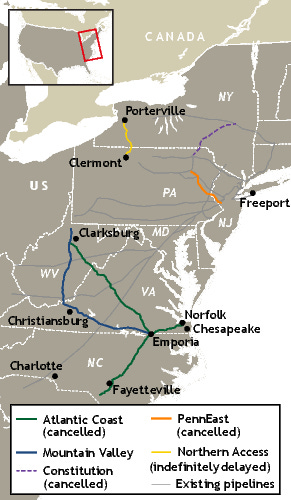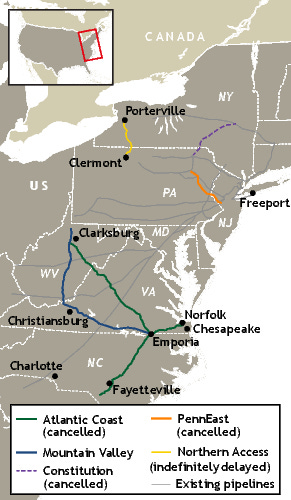Belated MVP line start-up shows US permitting troubles Market: Crude oil, Natural gas
The start-up of Mountain Valley Pipeline (MVP) after a delay of more than five years highlights the difficulty the US gas industry faces in building greenfield pipelines under current permitting rules
Belated MVP line start-up shows US permitting troubles
Market: Crude oil, Natural gas
26/06/24
It will take legislative changes to speed up the permitting processes that are hampering pipeline buildout, writes Chris Knight
The start-up of the Mountain Valley Pipeline (MVP) after a delay of more than five years highlights the difficulty the US gas industry faces in building greenfield pipelines under current permitting rules, which are unlikely to change any time soon.
The 2bn ft³/d (20.6bn m³/yr) natural gas pipeline began commercial operations on 14 June, at a $7.85bn price tag that was more than double the cost expected when the project was first proposed in 2015. It will move shale gas from a mountainous region in West Virginia to demand centres in Virginia, with the possibility of future expansions. MVP is expected to run at just 35-40pc of its nameplate capacity until downstream bottlenecks are removed, according to analyst groups RBN Energy and East Daley Analytics. The pipeline offers the promise of eventually easing price pressure in markets in the southeastern US and increasing Appalachian gas output that would otherwise remain constrained.
The pipeline — soon to change ownership once US independent EQT closes its $5.5bn all-stock acquisition of operator Equitrans Midstream — is the sole survivor of a round of eastern US pipeline cancellations in 2020-21 caused by permitting issues. MVP was also delayed by permitting lawsuits that forced construction crews to repeatedly halt work, adding billions of dollars to project costs as inflation increased the price of both labour and materials. Construction on the project resumed last year only after extraordinary intervention from the US Congress, which approved all remaining pipeline permits as part of an unrelated law that raised the limit on federal debt.
The permitting obstacles for pipelines in the eastern US show no signs of fading, despite smaller changes to speed permitting negotiated through legislation last year. Retiring US senator Joe Manchin, a Democrat from West Virginia, is circulating a comprehensive permitting package that he says would fast-track the approval process for pipelines and renewable energy projects. Gas groups say any meaningful permitting bill will have to revise the judicial process and limit the ability of states such as New York to continue using water permits to veto new pipelines. In exchange, renewable energy projects could follow a faster permitting schedule for electricity transmission.
But this is a deal many progressive Democrats are reluctant to take, particularly as they face the prospect that former president Donald Trump will win in US presidential elections in November. Far-right Republicans are hesitant to give President Joe Biden a permitting win when they believe they can get a better deal if Trump is elected. But without legislative changes, industry officials expect permitting delays to continue regardless of who is in the White House. "This is not a left or right thing," EQT chief executive Toby Rice says.
Sticky red tape
Trump's campaign says if he is elected, he will speed up approvals of gas pipelines serving the Appalachian basin by removing "all red tape". But his regulatory changes when in office failed to make a material difference in permitting timelines, and he repeatedly failed to broker a legislative deal to speed up permits.
Gas industry officials say they want to expedite permitting regardless of the election results and believe momentum could occur when voters start feeling the effects of delays. "The motivation for pipeline reform, I think, will increase when American consumers believe that their energy needs are impacted by the lack of infrastructure," Iowa-based Berkshire Hathaway Energy's gas transmission president, Paul Ruppert, says. The difficulty and time required to permit large greenfield pipelines in the eastern US has prompted developers to focus on adding capacity to existing pipelines or pursue shorter expansions instead.
Mountain Valley and its peers



